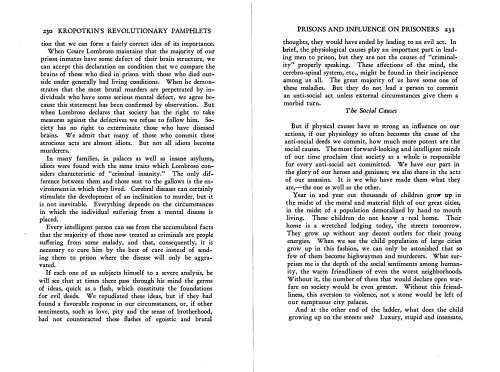Kropotkin's Revolutionary Pamphlets - Libcom
Kropotkin's Revolutionary Pamphlets - Libcom
Kropotkin's Revolutionary Pamphlets - Libcom
You also want an ePaper? Increase the reach of your titles
YUMPU automatically turns print PDFs into web optimized ePapers that Google loves.
Z30 KROPOTKIN'S REVOLUTIONARY PAMPHLETS<br />
PRISONS AND INFLUENCE ON PRISONERS<br />
a3 I<br />
tion that we can form a fairly correct idea of its importance.<br />
When Cesare Lombroso maintains that the majority of our<br />
prison inmates have some defect of their brain structure, we<br />
can accept this declaration on condition that we compare the<br />
brains of those who died in prison with those who died outside<br />
under generally bad living conditions.<br />
When he demonstrates<br />
that the most brutal murders are perpetrated by individuals<br />
who have some serious mental defect, we agree because<br />
this statement has been confirmed by observation.<br />
But<br />
when Lombroso declares that society has the right to take<br />
measures against the defectives we refuse to follow him.<br />
So<br />
ciety has no right to exterminate those who have diseased<br />
brains.<br />
We admit that many of those who commit these<br />
atrocious acts are almost idiots.<br />
murderers.<br />
But not all idiots become<br />
In many families, in palaces as well as insane asylums,<br />
idiots were found with the same traits which Lombroso considers<br />
characteristic of "criminal insanity."<br />
The only difference<br />
between them and those sent to the gallows is the environment<br />
in which they lived.<br />
Cerebral diseases can certainly<br />
stimulate the development of an inclination to murder, but it<br />
is not inevitable.<br />
Everything depends on the circumstances<br />
in which the individual suffering from a mental disease is<br />
placed.<br />
Every intelligent person can see from the accumulated facts<br />
that the majority of those now treated as criminals are people<br />
suffering from some malady, and that, consequently, it is<br />
necessary to cure him by the best of care instead of sending<br />
them to prison where the disease will only be aggravated.<br />
If each one of us subjects himself to a severe analysis, he<br />
will see that at times there pass through his mind the germs<br />
of ideas, quick as a flash, which constitute the foundations<br />
for evil deeds.<br />
We repudiated these ideas, but if they had<br />
found a favorable response in our circumstances, or, if other<br />
sentiments, such as love, pity and the sense of brotherhood,<br />
had not counteracted these flashes of egoistic and brutal<br />
thoughts, they would have ended by leading to an evil act. In<br />
brief, the physiological causes play an important part in leading<br />
men to prison, but they are not the causes of «criminality"<br />
properly speaking.<br />
These affections of the mind, the<br />
cerebro-spinal system, ,etc., might be found in their incipience<br />
among us all. The great majority of us have some one <br />
f<br />
these maladies.<br />
But they do not lead a person to commIt<br />
an anti-social act unless external circumstances give them a<br />
morbid turn.<br />
The Social CtfUses<br />
But if physical causes have so strong an influence on our<br />
actions, if our physiology so often becomes the cause of the<br />
anti-social deeds we commit, how much more potent are the<br />
social causes.<br />
The most forward-looking and intelligent minds<br />
of our time proclaim that society as a whole is responsible<br />
for every anti-social act committed.<br />
We have our part in<br />
the glory of our heroes and geniuses; we also share in the acts<br />
of our assassins.<br />
are,-the one as well as the other.<br />
It is we who have made them what they<br />
Year in and year out thousands of children grow up in<br />
the midst of the moral and material filth of our great cities,<br />
in the midst of a population demoralized by hand to mouth<br />
living. These children do not kno,! a real home. Their<br />
home is a wretched lodging today, the streets tomorrow.<br />
They grow up without any decent outlets for their young<br />
energies.<br />
When we see the child population of large cities<br />
grow up in this fashion, we can only be astonished that so<br />
few of them become highwaymen and murderers.<br />
What surprises<br />
me is the depth of the social sentiments among humanity,<br />
the warm friendliness of even the worst neighborhoods.<br />
Without it, the number of these that would declare open warfare<br />
on society would be even greater.<br />
Without this friendliness,<br />
this aversion to violence, not a stone would be left of<br />
our sumptuous city palaces.<br />
And at the other end of the ladder, what does the child<br />
growing up on the streets see?<br />
Luxury, stupid and insensate,

















